"Back in Vietnam, I thought Europe was pink. But it turns out it's black," wrote Anna Bui Thi Nhung in Berlin, after the 19-year-old embarked on a perilous journey halfway across the world. Last week, Nhung was believed to be among the 39 smuggled migrants found dead in the back of a lorry in Britain, the final destination where the victims were promised a better life.
Their hope ended in death.
As more chilling details of the tragedy emerged from the ongoing investigation, the scale and horrors of people smuggling, a highly lucrative international organized crime, have come into sharp focus. Countries were quickly blamed and shamed for driving migrants' desperation. However, the issue of people smuggling requires both a realistic and human understanding.
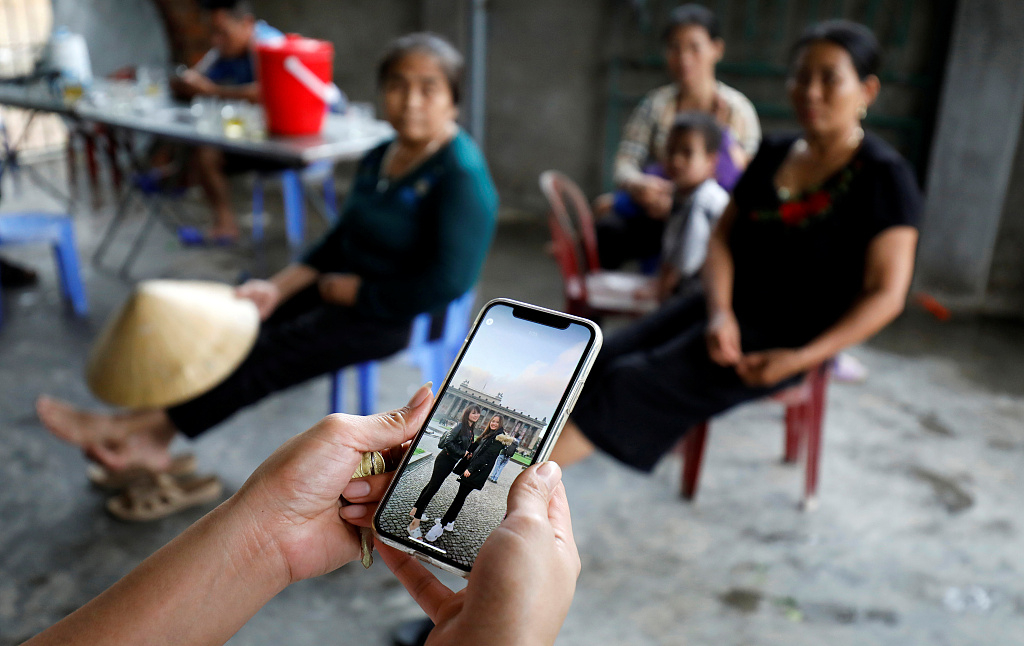
A relative shows a picture taken in Berlin of Anna Bui Thi Nhung (R) at her home in Nghe An province, Vietnam, October 26, 2019. /VCG Photo
A relative shows a picture taken in Berlin of Anna Bui Thi Nhung (R) at her home in Nghe An province, Vietnam, October 26, 2019. /VCG Photo
British politicians and law enforcement have renewed calls to fight human trafficking in the wake of the lorry tragedy. Dave Wood, a former director general of British immigration enforcement, said human trafficking is "a growing industry and a major outlet for organized crime."
There are differences and overlaps between migrant smuggling and human trafficking. "While smuggling involves someone facilitating the crossing of a border, trafficking involves an act or intention of exploitation," explained Cornelius Leonard Brueser, Migration Advisor for Asia Pacific of the International Committee of the Red Cross (ICRC).
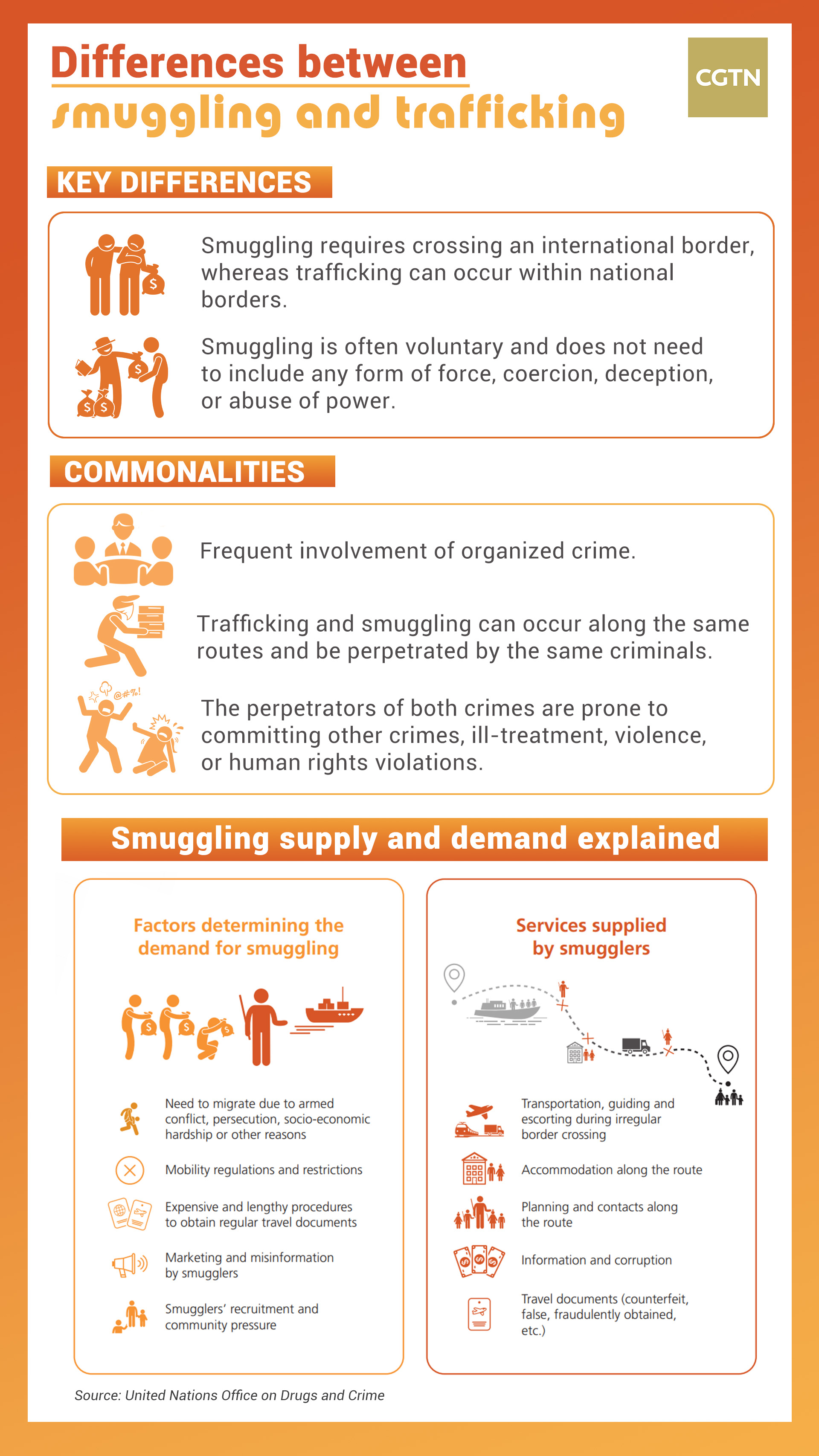
CGTN graphic designed by Du Chenxin.
CGTN graphic designed by Du Chenxin.
Criminal network, deadly business
Like dealers of drugs and firearms, people smugglers rake in huge profits while committing a crime against the state. However, people smuggling has relatively low risks for the criminals, who take advantage of those seeking a better life in another country. People smuggling syndicates are run like businesses with the sophistication of any other transnational organized crime, and affecting almost every country.
In recent years, countries in the European Union have faced particularly severe challenges from irregular migration. A report jointly published by Europol and Interpol in 2016 estimates that more than 90 percent of the migrants coming to the EU are facilitated by a criminal network.
The United Nations Office on Drugs and Crime (UNODC) estimates that at least 2.5 million migrants were smuggled in 2016, generating nearly 7 billion U.S. dollars for people smugglers. According to the UN agency, which is responsible for countering international organized crimes, people smuggling makes more money than drug smuggling, but the amount of convictions for people smuggling are nowhere near drugs.
Yet the human costs resulting from these activities are immeasurable, as evidenced by last week's event in Essex. Since 2014, an estimated 19,000 people have lost their lives trying to reach EU territory. Thousands of people have lost their lives as a result of the indifferent or even deliberate actions of migrant smugglers, according to the UNODC.
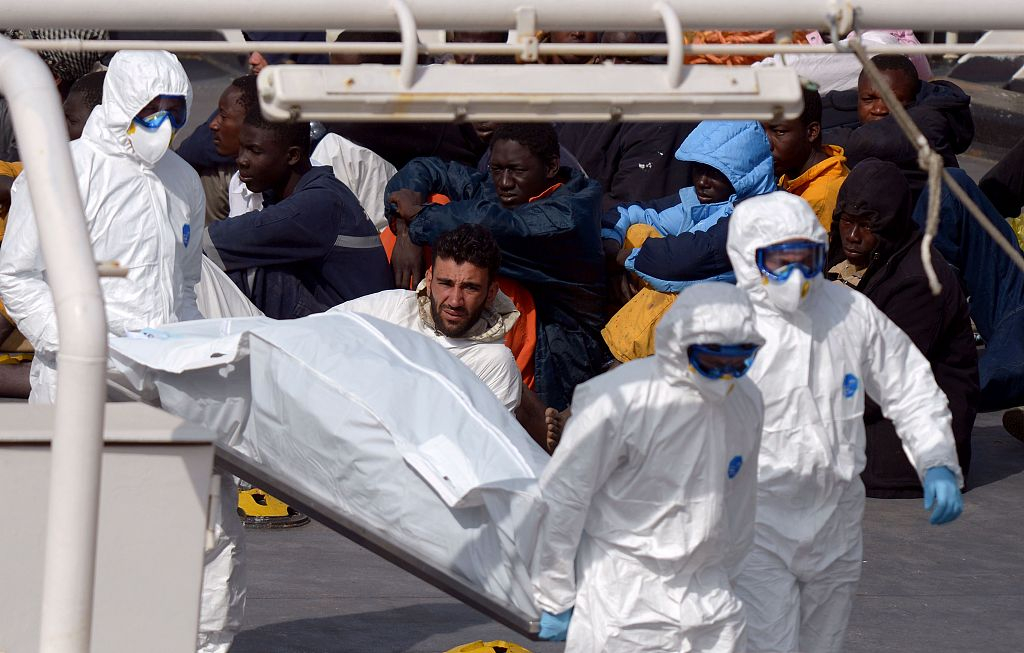
Italian police arrest the captain of an overcrowded migrant boat that capsized in the Mediterranean, causing the deaths of an estimated 800 people, April 20, 2015. /VCG Photo
Italian police arrest the captain of an overcrowded migrant boat that capsized in the Mediterranean, causing the deaths of an estimated 800 people, April 20, 2015. /VCG Photo
Driven by profits, smugglers have little concern for migrants' safety and well-being. Their illegal status in the destination country usually means the smuggled migrant must stay under the authorities' radar. This creates an environment where the smuggled person may be subject to threats and exploitation at the hands of smugglers, and be victim to crimes that often go unreported. In some cases, they could fall into modern-day slavery like victims of trafficking in order to pay off debts incurred from their transportation.
People smuggling is closely tied to other crimes such as document fraud, and fuels illicit money transfer, corruption and terrorism. A 2018 report by UNODC found systematic corruption at almost all levels, with corrupt practices linked to migrant smuggling reported along nearly all identified routes.
"Migrant smuggling represents a serious threat to national and human security," said Jeremy Douglas, UNODC Regional Representative for Southeast Asia and the Pacific. "It is leaving exceptional numbers of people vulnerable to different forms of abuse, including human trafficking."
What's behind the rise of smuggling?
In a world where international travel is increasingly common and available, more people are smuggled across national borders, and risking death to do so.
In the same week 39 people were found dead in a refrigerated lorry, several separate incidents involving migrants hidden in a commercial vehicle were discovered by authorities in Belgium, France and the U.S. Children were among those smuggled.
The British National Crime Agency reported a rise in the number of migrants being smuggled into the UK in containers and lorries in the last year. Across the pond, U.S. Border Patrol has also seen a spike in the use of commercial vehicles to smuggle migrants across the southern border. Authorities in both countries have cited tightened border control as a main cause for migrants taking greater risks.
The International Organization for Migration says hardening attitudes towards migrants are to blame for many migrant deaths in recent years.
With the rise of populism and anti-immigration sentiments in Western Europe and the U.S., walls and fences have gone up, and entry options have shrunk. But that has not slowed the demand for the one-way migration to wealthier countries. Since full-blown conflicts began in Syria, there has been an exponential increase in the number of people seeking asylum, and it has become difficult for authorities to differentiate between refugees and so-called "economic migrants" seeking a better life in a more affluent country.
As illegal border crossing becomes increasingly difficult, many migrants have turned to criminal gangs, who would facilitate their entry by evading border controls and visa requirements. Depending on what one is willing to pay, smugglers will offer sophisticated and expensive "services" involving document fraud as well as dangerous low-cost methods at the migrant's expense.
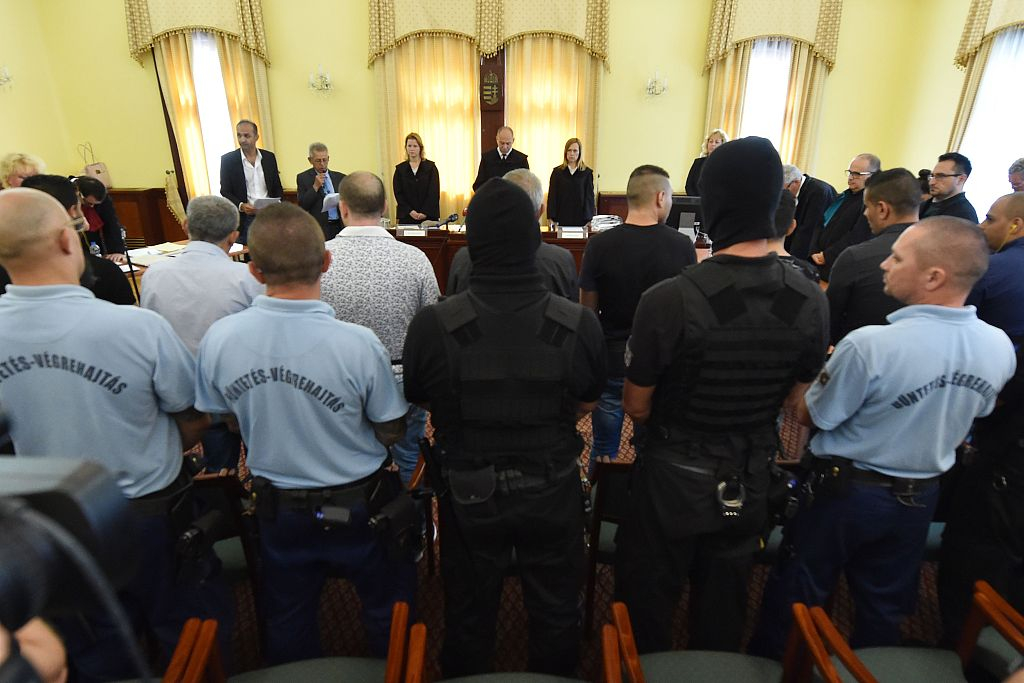
A Hungarian court sentences four suspects for the gruesome deaths of 71 migrants who suffocated in a lorry four years ago in Austria, June 20, 2019. /VCG Photo
A Hungarian court sentences four suspects for the gruesome deaths of 71 migrants who suffocated in a lorry four years ago in Austria, June 20, 2019. /VCG Photo
The role of technology
Most smuggling business is now conducted online, UNODC's 2018 report revealed, as criminals use the internet or dark web to recruit, communicate and advertise their services – some in the open. Mainstream social media platforms including Skype, WhatsApp and Facebook are found to have been used by migrants to exchange information about smuggling services. On some Facebook pages, smugglers pretend to work for NGOs or pose as "legal advisers" for asylum seekers, according to the report. Some smugglers are also known to have exploited fears of policy change related to Brexit as a marketing tool.
These ads are usually posted with attractive images of the destination to sell the dream of a better life to prospective migrants. Unfortunately, more often than not, reality is anything but what was advertised.
The family of Pham Thi Tra My, one of the Vietnamese victims on the ill-fated lorry, reportedly paid smugglers around 30,000 British pounds (38,800 U.S. dollars) for her "VIP" trip to the UK. "If I had known she would go by this route, I would not have let her go," the grieving father of the 26-year-old told media.
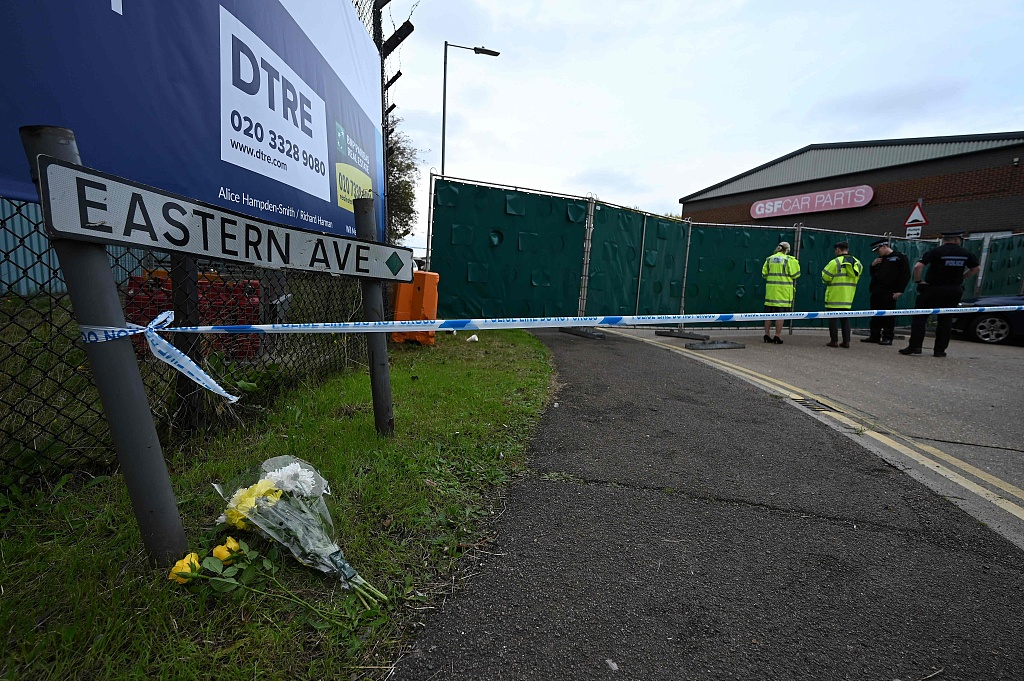
Flowers are left by a road sign at Waterglade Industrial Park in Grays, east of London, after the discovery of 39 dead bodies inside a lorry, October 23, 2019. /VCG Photo
Flowers are left by a road sign at Waterglade Industrial Park in Grays, east of London, after the discovery of 39 dead bodies inside a lorry, October 23, 2019. /VCG Photo
While some low-level driver might stand trial for such a crime, the real brains often remain safely in the shadows, nowhere near the location of said crime. The involvement of cash-strapped locals makes it even harder for authorities to pin down and prosecute those operating behind the scene.
At the height of Europe's migrant crisis in 2015, 100 Britons were jailed for aiding the smuggling of migrants through the French port of Calais. In the U.S., more than 60 percent of people convicted of smuggling in federal courts in recent years have been American citizens. Participants can range from truck drivers, single mothers to high school students, the majority of whom had little or no criminal history.
These factors highlight the need for coordinated responses across regions and adapting to new methods, UNODC noted, since smuggling networks are able to adapt their methods to keep them one step ahead of law enforcement.
"Authorities need to change the incentives for migrant smugglers and migrants. This means combining law enforcement and criminal justice action to dismantle smuggling networks with measures that promote legal migration," said Benjamin Smith, UNODC Regional Coordinator for Migrant Smuggling and Human Trafficking.
Protecting human rights
The UN Smuggling of Migrants Protocol requires states not to criminalize migrants for the fact of having been the object of the crime of smuggling. However, UNODC says that violations of migrants' rights to protection, enshrined in the 2000 protocol, have been recorded in some countries.
The UN Refugee Agency says unless states employ a rights-based approach, they will fail to prevent and address the violations of migrants' human rights.
In either case of smuggling or trafficking, the victims should not be criminalized or stigmatized, nor should any assistance they receive be conditioned on their cooperation with judicial authorities, said Brueser, adding that countries of transit and destination should establish, enable and support humanitarian rescue activities if migrants are in distress and in areas where there is a known risk that migrants might die or go missing.
"We call on states to provide safe pathways for migration, which would also contribute to preventing smuggling and trafficking," he said. "Migration occurs for a large variety of reasons, and, behind every migrant, there is a family anxious for news. Every migrant has a right to have their dignity and human rights respected."